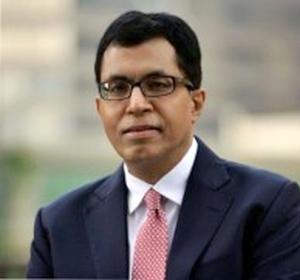'We emphasise the importance of not basing investment decisions solely on electoral outcomes.'
'Instead, focusing on investing in high-quality businesses capable of prospering regardless of the political landscape is paramount.'

The recent spike in volatility, often observed preceding big events, is compounded by quarterly earnings and a renewed focus on China, according to Pratik Gupta, CEO and co-head of Kotak Institutional Equities.
In an e-mail exchange with Samie Modak/Business Standard, Gupta highlights that Indian markets are currently displaying signs of being relatively expensive, cautioning investors, particularly in the smallcap space.
Volatility has spiked recently. What, in your opinion, is driving this increase?
This phenomenon often precedes big events, such as India's election results on June 4.
Additionally, we're witnessing sharp stock-specific reactions to companies' January-March quarterly results.
For foreign portfolio investors, it's the shifting expectations surrounding the timing of interest rate cuts by the US Federal Reserve, coupled with renewed interest in China, and India's relatively high valuations, that are prompting foreign outflows and contributing to heightened volatility.
Smallcaps have recouped all their losses. What has fuelled this rebound?
The resurgence in smallcaps is primarily fuelled by retail and wealthy investors, who have reaped strong gains over the past year.
This investor segment appears optimistic about bold economic reforms following the formation of a new government.
However, I would advise exercising caution amidst this buoyant sentiment, emphasising the importance of monitoring valuations.
Some smallcaps exhibit minimal liquidity, making them susceptible to sharp declines in stock prices even with minor selling pressure.
Do you see any method to the madness in the recent rebound, particularly in the broader markets?
We perceive the Indian market to be somewhat overvalued overall, relative to its historical benchmarks, growth potential, and return on equity prospects, as well as in comparison to other emerging markets.
While there are instances of overexuberance in certain smallcaps, many largecaps -- especially in financial services -- are currently priced attractively.
Generally, it's premature to assert that we're in a bubble territory for the entire market.
The benchmark National Stock Exchange Nifty is trading at about 20 times one-year forward earnings, which is relatively expensive but not indicative of a bubble scenario warranting a 40-50 per cent correction, barring any significant geopolitical or economic upheavals.

IMAGE: Pratik Gupta
Photograph: Kind courtesy Pratik Gupta/Linkedin
What factors could support investor optimism or valuation multiples in the small and midcap space? How do you view the valuations of largecaps in comparison, and do they provide greater safety?
Over the past year, the Nifty 50 has delivered returns of about 24 per cent, while the Nifty Smallcap 100 and the Nifty Midcap have recorded returns of 72 per cent and 59 per cent, respectively.
The upswing in small and midcap stocks is primarily fuelled by domestic investors such as mutual funds, retail traders, and high networth individuals.
The latter group appears particularly enthused by prospects of an acceleration in economic growth after the elections, which could lead to earnings upgrades in many smallcaps.
In addition, there is the expectation of a reduction in local interest rates.
However, we caution against excessive optimism based on these assumptions, especially regarding smallcaps, given current valuations.
In general, largecaps offer relatively better risk/reward ratios at this juncture.
How did the fourth-quarter results season fare? Is India Inc on track to meet its earnings per share growth estimates for 2024-2025 (FY25) and 2025-2026 (FY26)?
The March-ended quarterly results and accompanying commentary have presented a mixed picture.
For instance, information technology services and chemicals have underperformed expectations, while most banks, non-banking financial companies, real estate, and hotels have exhibited relatively stronger performance.
However, overall, there has been no major deviation from our forecasted earnings growth estimate of about 14 per cent for both FY25 and FY26.
While the India Vix has fired up, the market appears largely unfazed by the impending elections. Do you foresee any unforeseen developments?
Elections are inherently unpredictable, and even seasoned exit poll experts can err in their predictions.
Presently, the market appears to be operating under the assumption of the incumbent government's easy re-election; thus, any alteration in this expectation could potentially pose a negative surprise.
However, we emphasise the importance of not basing investment decisions solely on electoral outcomes.
Instead, focusing on investing in high-quality businesses capable of prospering regardless of the political landscape is paramount.
Are there any major global headwinds that could affect domestic markets? What's the outlook for FPI flows?
There are two primary risks to monitor closely.
Firstly, the possibility of global interest rates persisting at elevated levels for an extended period, or even a scenario of no rate cuts this year, could dampen global risk appetite.
Secondly, geopolitical tensions, such as those between Israel and Iran or the US and China, have the potential to trigger an oil price surge or sharp foreign outflows.
Chinese equities have recently shown robust performance. How do you interpret this trend, and does it dull India's attractiveness to global funds?
The Shanghai Composite Index has risen by nearly 15 per cent from its 2024 lows.
Despite this surge, its valuation remains at less than half of Nifty's, prompting some global EM funds to shift tactically from India to China, driven by our market's outperformance over the past year.
This trend might persist in the short term. However, many global investors perceive China to be plagued by structural growth challenges, compounded by geopolitical tensions with the US.
Consequently, this shift is viewed as a transient phenomenon.
If India sustains its growth momentum, we expect continued robust foreign inflows.
Nonetheless, China's dim long-term prospects have tempered flows into global EM funds, as its considerable 25 per cent weighting in the MSCI EMs Index limits the pool of money available for investing in India.
Do you have any particular sectors or themes that you are bullish or bearish on?
At present valuations, we favour the financial sector, including banks, NBFCs, and life insurance companies, alongside real estate, hotels, telecommunications, airlines, and certain new-age Internet-based enterprises.
However, we approach export-oriented sectors such as IT services and chemicals with caution in the short term.
Disclaimer: This article is meant for information purposes only. This article and information do not constitute a distribution, an endorsement, an investment advice, an offer to buy or sell or the solicitation of an offer to buy or sell any securities/schemes or any other financial products/investment products mentioned in this article to influence the opinion or behaviour of the investors/recipients.
Any use of the information/any investment and investment related decisions of the investors/recipients are at their sole discretion and risk. Any advice herein is made on a general basis and does not take into account the specific investment objectives of the specific person or group of persons. Opinions expressed herein are subject to change without notice.
Feature Presentation: Rajesh Alva/Rediff.com












 © 2025
© 2025